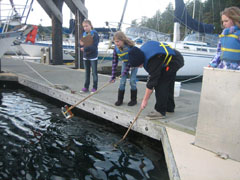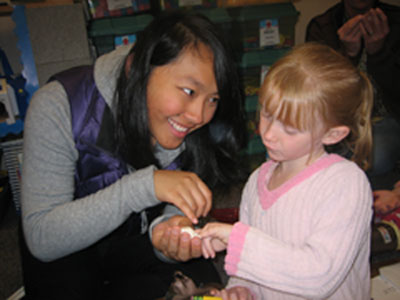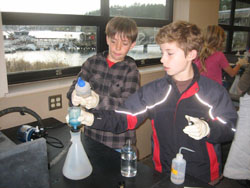The Friday Harbor Labs Science Outreach Program has been busy getting students involved in the process of science.
The Friday Harbor Marina Water Quality Monitoring Project
– Sampling was conducted three times in the fall semester by three different 5th grade classes from Friday Harbor Elementary School. Each sampling period consisted of a classroom introduction to the project, a sampling and processing day in the field and lab (at UW Friday Harbor Labs) and then analyzing the Fecal coliform results 24 hours after collection. In the field, six sites were sampled for Fecal coliform levels, temperature, salinity and direction of flow. This water quality monitoring project was then repeated by each class again in the spring. Results are reported to the Port of Friday.
Each sampling period consisted of a classroom introduction to the project, a sampling and processing day in the field and lab (at UW Friday Harbor Labs) and then analyzing the Fecal coliform results 24 hours after collection. In the field, six sites were sampled for Fecal coliform levels, temperature, salinity and direction of flow. This water quality monitoring project was then repeated by each class again in the spring. Results are reported to the Port of Friday. Watershed Stream Surveys
Watershed surveys were conducted by 6th, 7th and 8th graders from Spring Street International School in both the False Bay Watershed and Beaverton Valley Watershed. Both of the watersheds' physical, biological and geological characteristics were surveyed along with drawing sampling site illustrations. This activity is in preparation for more extensive sampling that will be conducted in the spring.First Grade "Private Eyes"
 Students enrolled in Marine Biology (Biol 250, taught by Emily Carrington each autumn) worked with FHLSOP to help first graders at Friday Harbor Elementary School develop their "Private Eyes" for science. The UW FHL students served as one-on-one mentors to the budding scientists, as they used eye loupes to explore the intricate patterns of leaves and shells and then generate hypotheses about the function of the forms they observe. Those six year olds are eager to share their lively ideas with their very own College Scientist!
Students enrolled in Marine Biology (Biol 250, taught by Emily Carrington each autumn) worked with FHLSOP to help first graders at Friday Harbor Elementary School develop their "Private Eyes" for science. The UW FHL students served as one-on-one mentors to the budding scientists, as they used eye loupes to explore the intricate patterns of leaves and shells and then generate hypotheses about the function of the forms they observe. Those six year olds are eager to share their lively ideas with their very own College Scientist! The Invasive Mussel Project
Two Biology classes from Friday Harbor High School and one Marine Science class from Spring Street International School participated in a nine day lab to assess the spread of a non-native farmed mussel in the wild population of mussels in Westcott Bay. Students extracted, purified, isolated, amplified, separated by electrophoresis, and stained mussel DNA. The end result was the students were able to identify non-native mussels from the native species by looking at their DNA fingerprint. This lab is a great experience because it not only involves the students in a real conservation monitoring project with results being reported to the University of Puget Sound but also introduces them to for the first time to biotechnology equipment and procedures.
Student comments
- "The lab was so fun! I love the hands-on experience with the lab. Actually doing the work is so much better that just looking at a book, I felt like a real scientist!" "I thought this was an amazing lab. Getting to do this "wet" lab with all the tools and chemicals has been awesome and I can't wait for the next one." "I really enjoyed this lab. Using the pipettes and other tools like the centrifuge was fun. The lab was interesting and I learned a lot." "I really had fun in the lab. The flowcharts helped me organize for the day ahead so I was well prepared. It was fun to succeed at our real-life science project."To learn more about upcoming FHLSOP projects that engage students in the process of science see our website at http://depts.washington.edu/fhlk12/index.html. If you'd like to help support FHLSOP please contact Rachel Anderson at 206-616-0760 or by
e-mail, rachelea@uw.edu.
photos: Jenny Roberts
